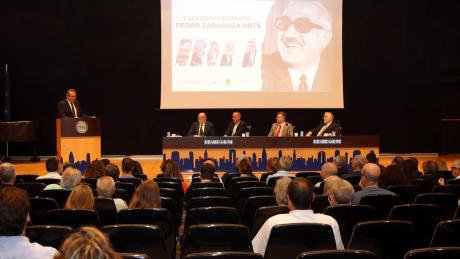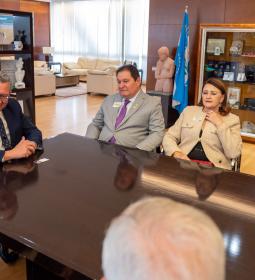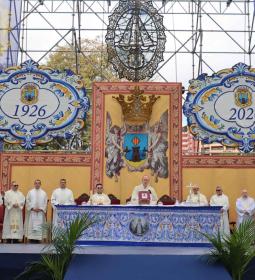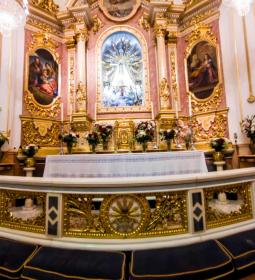Professor Fernando Vera and Professor Armando Ortuño share anecdotes and stories with Francisco Zaragoza, son of the former mayor
The round table 'Y despertó Benidorm' addresses the figure of Pedro Zaragoza from the tourism, urban and family perspective
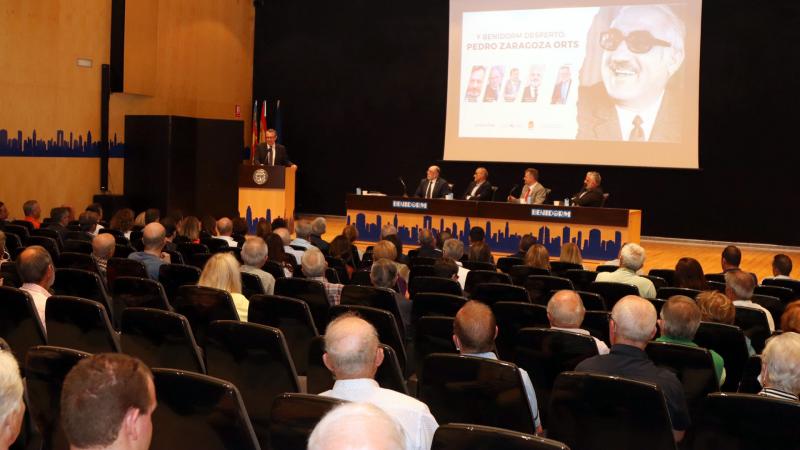
The round table 'Y despertó Benidorm: Pedro Zaragoza Orts' addressed yesterday the figure of the former mayor of the city between 1950 and 1966 from the perspective of tourism and urban management promoted and developed during his mandate, and also his family facet. The professor of Regional Geographic Analysis at the University of Alicante (UA) and an expert in Tourism, Fernando Vera Rebollo; and Armando Ortuño, professor of Territory at the UA and director of Pedro Zaragoza Orts Chair; shared a dialogue with Francisco Zaragoza Ivars, lawyer and son of the former mayor.
The round table, held in the assembly hall of the Benidorm City Council and organized by the Frax Foundation and the Department of Culture, was attended by, among others, the mayor, Toni Pérez; the mayor of Culture, Jaime Jesús Pérez; members of the Corporation; the president of the Frax Foundation, Matías Pérez Such; the president and general secretary of Hosbec, Toni Mayor and Nuria Montes; relatives of Pedro Zaragoza Orts; as well as neighbours and relatives of the former mayor. A round table that is part of the 'Pedro Zaragoza Orts Year', which began on May 15 and will continue until May 14, 2023.
Pedro Zaragoza was a "multifaceted" figure, as defined by the journalist Juan Díaz, moderator of the table. Hence, during the dialogue, various stories and anecdotes arose about some of the milestones and achievements that made Pedro Zaragoza a benchmark in tourism and urban planning and that contributed capitally to the transformation of Benidorm to the point of making it a tourist destination of international projection, which only in his years of government multiplied its population by more than five.
Thus, Fernando Vera highlighted that Pedro Zaragoza was a pioneer in conceiving the tourist destination in an integral and "unbiased" way, in whose configuration three aspects prevailed: the bringing of drinking water and its distribution to homes; the care of the beaches; and the planning of a compact urban model capable of generating activity. All this was backed by totally innovative marketing and promotion strategies, which were not limited to the national territory, but went beyond borders.
Vera emphasized that Pedro Zaragoza "knew how to see the quantitative and qualitative transformation that tourism was undergoing at an international level", with a middle class that was beginning to travel and increasing demand. That perspective, he affirmed, allowed him to "adapt to change and transcend internationally", making Benidorm a holiday destination for this new demand.
Armando Ortuño, for his part, focused on Pedro Zaragoza's commitment to define a compact urban model and to illuminate a General Plan that would encompass the entire municipal area at a time when this type of document was limited only to large cities. . Ortuño assured that the former mayor is “a myth, that with the support of a town he was the leader who laid the foundations for Benidorm to be one of the three best cities in the world to live in”.
He emphasized the "sustainability" of this compact city model, which currently has a water distribution network with a performance of 95% and that values its natural resources.
Francisco Zaragoza indicated that in each challenge that his father undertook "he always knew how to surround himself with those who knew the most"; a formula that was tremendously successful in the field of urban planning; and recalled how the relationship was forged between Pedro Zaragoza and His Royal Imperial Highness Otto of Habsburg, whose time with Benidorm attracted influential people from his environment to the city who became prescribers of the city when they returned to their countries.
On a more personal level, he influenced Pedro Zaragoza's permanent desire for continuous learning and for acquiring knowledge, graduating in Law when he was over 50 years old, graduating in Tourism when he turned 20 and then enrolling in Journalism. Also, they highlighted his delivery and dedication to Benidorm and its neighbours; his ability to "build trust" among the population so that they enthusiastically joined the revolution that he proposed and that he "knew they would understand"; and his support "for local entrepreneurs" who entrusted their capital to the tourist transformation.
Professor Fernando Vera concluded that Pedro Zaragoza is the confirmation that "the works remain".
In his case, “an internationally relevant urban and tourist model”. "Others -he added- have been able to continue their work to maintain a paradigmatic tourist destination, which has been able to reinvent itself and always be one step ahead".
Francisco Zaragoza thanked the Benidorm City Council for the commemoration of the centenary of his father's birth, and assured that the family is "tremendously excited".
To close the event, the mayor explained that among the actions promoted for this centenary, yesterday's is "the first act of delving into the life, work, person, figure and character that Pedro Zaragoza is and how much that he represents for Benidorm”, that it was “his people” and that he took “that leap to become a city precisely under his mandate”.
Toni Pérez highlighted "how much we all learned from Pedro Zaragoza" and stated that Benidorm, from that configuration, "was designed to be environmentally, socially and economically sustainable", and this means that "the city is the destination". “If we hadn't had that city structure, surely we wouldn't have done so well, neither in these decades nor in the last few difficult years that we've had to live through,” he added.




